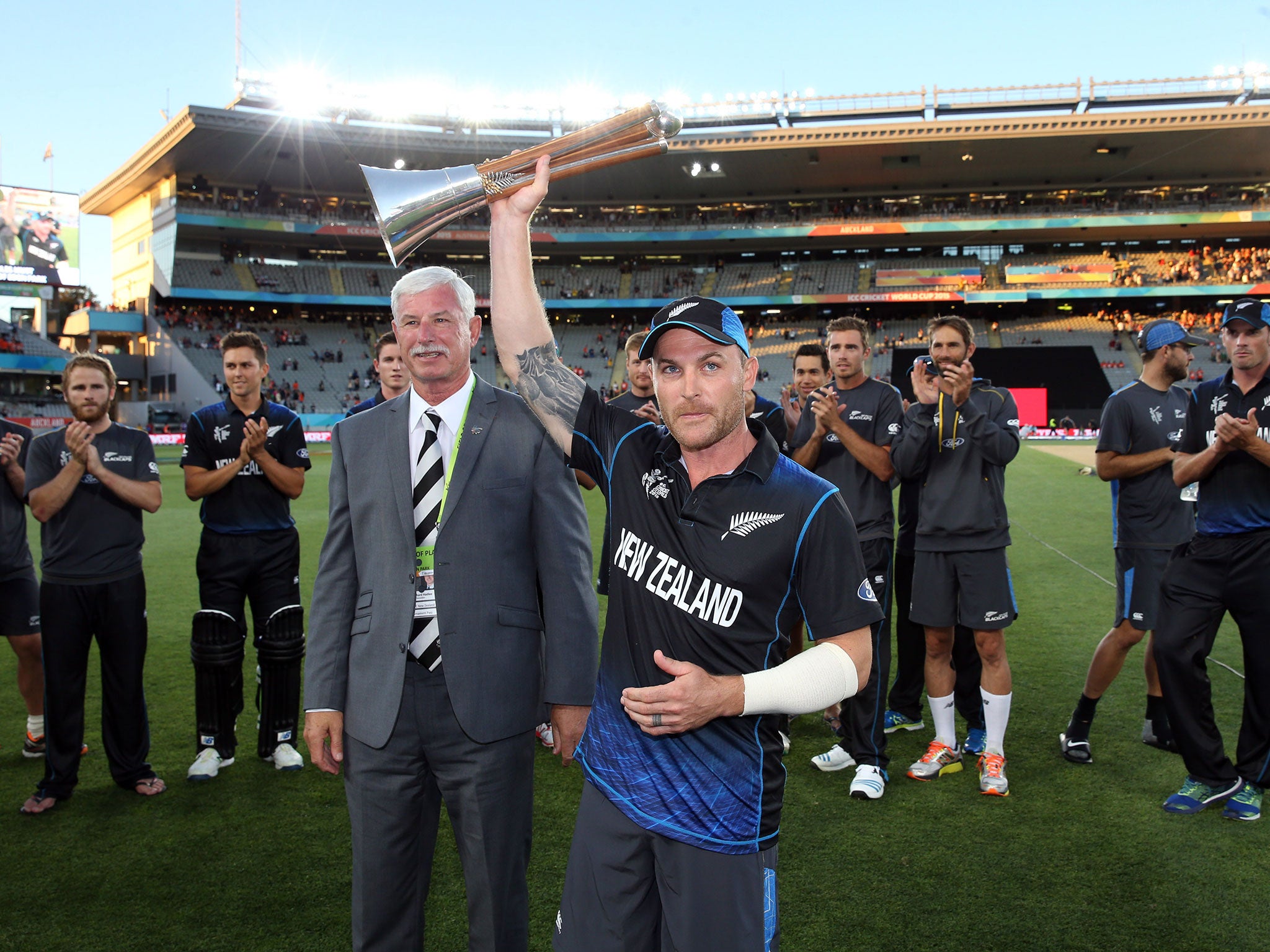Cricket World Cup 2015: Australia vs New Zealand match report: Kiwis hold on to claim thrilling victory over rivals
Australia 151 all-out (32.2 overs), New Zealand 152-9 (23.1 overs)

If the World Cup was in need of a truly epic match, there could have been none finer, more engrossing or heart-stopping. Its major narrative, perversely in a tournament of ever more gigantic hitting, concerned wonderful bowling exhibitions, comprising high pace, masterful swing and guileful spin, which frequently reduced batting to anxious guesswork.
From start to early finish, it was a nerve-shredding delight. New Zealand defeated their joint hosts, Australia by one wicket. Australia were bowled out in 32.2 overs for 151, New Zealand responded with 152 for 9 in 23.1.
With six still needed for victory and the Kiwi crowd in a jam-packed Eden Park fraught with tension after five wickets had gone down for 15 runs, it seemed that Australia, because they were Australia and never give up, were on the verge of a most improbable victory. But as if he were playing in the back garden and not in this unbearable cauldron, Kane Williamson, the admirable New Zealand batsman, stepped forward and launched a sweet, orthodox six over long on. And it was done.
Cricket World Cup 2015: 10 young players to watch
Show all 10Ultimately, New Zealand deserved their victory but had Australia created an upset at the last, they could not have been begrudged. It was a match in which both sides exposed their vulnerabilities, created largely by the expectations fomented by playing in a World Cup at home, but in which both doggedly refused to surrender.
Michael Clarke, the returning Australian captain, was hugely generous in defeat. “It was hugely entertaining game which we’d have liked to have won,” he said. “Our batting was horrendous to put it politely, but credit has to go as well to New Zealand’s bowlers. It was a really good wicket and the crowd were fantastic.”
The truth was that the crowd were on Australia’s case throughout. Only in the final moments were they briefly stilled, stunned into silence. They loathed and feared Clarke then in equal measure, the man known as Pup then, but they could not give voice to it. But they made a difference at the height of the affair when Australian wickets were tumbling.
Brendon McCullum, the winning captain, said: “I was just saying to Pup that we should go and that again. It was one hell of a game. It was an amazing atmosphere and a great game to be a part of.”
There were outstanding individual performances on both sides. Trent Boult took 5 for 27 for New Zealand with fast, accurate swing bowling designed to elicit error in leaden footed batsmen. But he was helped to expose those frailties by the veteran left arm spin bowler, Daniel Vetorri, whose calm, understated entry changed the course of the match.
Vettori was called on after only six overs when Australia were threatening mayhem. True they had lost an early wicket but under David Warner’s belligerent countenance, they were cutting a dash so swaggering that totals of 400 were being estimated. Vettori made them think again.
At the end of Australia’s innings when they had tottered to 106 for nine they were given something worth defending by the old hand of Brad Haddin, a man who typifies the way his country play cricket, which is to say that they not only believe they are never beaten but have a divine right not to be beaten. In a last wicket stand of 45, Haddin gave Australia faint hope.
And then came Brendon McCullum. This World Cup already knows all about McCullum. He had carved, pulled, driven and generally smashed England to distracted defeat. Now he threatened to do the same to Australia. He scored 50 from 28 balls, New Zealand were 78 for 1.
It was time for Mitchell Starc to make his entrance. Starc is a bowler at his zenith. Think Mitchell Johnsomn with slightly more control and a readier smile, but with similar pace and the ability to cause destruction.
Starc removed McCullum who flat-batted to mid-off and either side of the break, with probing yorkers, Ross Taylor and Grant Elliott. New Zealand rebuilt. They had to. But they were beset by anxieties. Starc was taken off after six overs. Suddenly, briefly, crucially, runs flowed off Johnson. They made their way to 131, 21 short.
The finishing line was too close for New Zealand. They could see it and it meant too much. Starc was brought back. He was quite irresistible. He produced an unplayably accurate short ball to Luke Ronchi and two short balls in a similar category to Adam Milne and Tim Southee, which would have accounted for more authentic batsmen.
Williamson was surveying all this. Importantly, he was never troubled. Perhaps he will rue taking the single that put young Milne on strike but what else was he to do at that stage?
Clarke said simply and accurately: “Mitchell Starc was a genius.” McCullum had another important point. “Trent Boult was outstanding, Mitchell Starc was outstanding and the support acts were brilliant as well. Some of the batting wasn’t as good as it should have been but when you’re up against high class swing bowling at pace as well that can happen.” It is not always a batsman’s game. It was marvellous.
Subscribe to Independent Premium to bookmark this article
Want to bookmark your favourite articles and stories to read or reference later? Start your Independent Premium subscription today.

Join our commenting forum
Join thought-provoking conversations, follow other Independent readers and see their replies